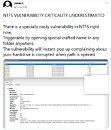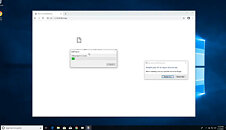Monday, January 18th 2021

Critical Flaw in Windows 10 Could Corrupt Your Hard Drive
Windows OS security is taken seriously, as the OS is wide-spread across millions of PCs around the world, however, there may be issues where OS has some security flaw that is found by external researchers. Due to the sheer code base of the new OS like Windows 10, there are a plethora of bugs and security flaws waiting to get discovered by someone. And today, thanks to the team of cybersecurity researchers, we have found out that in Windows 10 file-system called NTFS, there is a bug that corrupts your hard drive by simply triggering a specific variable name in a file.
If the end-user inside Windows 10 tries to access the NTFS attribute called "$i30" in a specific way, the flaw is exploited. The NTFS search index attribute, specifically the string "$i30", is containing a list of files and subfolders in a directory, and there is even a log of deleted files and folders. After running a specific command inside the command line (CMD) or inside the browser, Windows will start to display warnings of "File or directory is corrupted and cannot be read". After that, the OS will prompt a user to restart the machine and repair the damaged drive, so the Windows disk check utility will start. Once corrupted, Windows 10 will start displaying a notification indicating that the main file table (MFT) on the particular disk is corrupted and thus can not operate. Starting from the build Windows 10 Build 1803 the OS is vulnerable until the current version and a possible fix is expected to be released soon.
Sources:
Jonas L (Twitter), Siam Alam (Twitter), via Security Newspaper
If the end-user inside Windows 10 tries to access the NTFS attribute called "$i30" in a specific way, the flaw is exploited. The NTFS search index attribute, specifically the string "$i30", is containing a list of files and subfolders in a directory, and there is even a log of deleted files and folders. After running a specific command inside the command line (CMD) or inside the browser, Windows will start to display warnings of "File or directory is corrupted and cannot be read". After that, the OS will prompt a user to restart the machine and repair the damaged drive, so the Windows disk check utility will start. Once corrupted, Windows 10 will start displaying a notification indicating that the main file table (MFT) on the particular disk is corrupted and thus can not operate. Starting from the build Windows 10 Build 1803 the OS is vulnerable until the current version and a possible fix is expected to be released soon.


124 Comments on Critical Flaw in Windows 10 Could Corrupt Your Hard Drive
The size code base is irrelevant, such problems are inexcusable. These problems has plagued Windows for decades, and will continue to do so until MS does a complete overhaul of the kernel. Patchwork can't solve this.What about setting the network connection as metered and disable updates on a metered connection?
Wonder if linux pukes too
Oh, and by the way, I watched a YouTube video where a malformed NTFS file system crashes even Linux, BSD, and MacOSX. Simply plugging in a USB drive with said malformed NTFS file system will crash even those operating systems.
I am not filled with confidence.
.
.
.
:p
Why would I even want to do that? :wtf:
That is besides the fact that new kernels need a lot of work, which you clearly stated.You know, if I had the programming/coding knowledge for it, I'd love to have a one-on-one with the people behind the NT 3.1 kernel and ask perhaps even the silliest questions about how it came to be. I honestly would feel like the child that it's being told a fantasy story with how I'd be so invested in that :D :laugh:
www.bleepingcomputer.com/news/security/windows-10-bug-crashes-your-pc-when-you-access-this-location/
Entering the following string into cmd or a web browser will cause a BSOD (Try this at your own risk, preferably in a VM).
Similar to the NTFS issue, this doesn't do anything in versions older than 1709. Even Windows 7 and XP are unaffected. Kinda makes me wonder what M$ changed that would cause this.
M$ needs to get their shit together.
EDIT: Apparently the NTFS flaw in the article isn't as severe as people think it is.
I guess it corrupts some metadata file somewhere, which causes the entire FS to be marked as dirty, which triggers the chkdisk scan. Accessing other $i30 attributes doesn't do anything.
Also apparently it works in XP, but not 7.
EDIT 2: Just tried both flaws in a Win10 1809 VM. The BSOD one caused the VM to lock up and restart, no BSOD.
The NTFS one caused chkdisk to run upon rebooting, and pretty much nothing else happened. The VM started right back up as if nothing happened. Interestingly I didn't get any notifications that anything happened after running the command. Cmd returned that the file was corrupted, and I also manually checked the disk for errors, and it said it needed to repair the disk. I also ran SFC after rebooting and it passed with no errors.
Pretty sure the NTFS one is mostly harmless (save for maybe some extra wear on your boot drive), and the BSOD one carries any risks associated with system crashes.
NTFS is hot garbage when you compare it to options like APFS, ext4, btrfs, and f2fs.